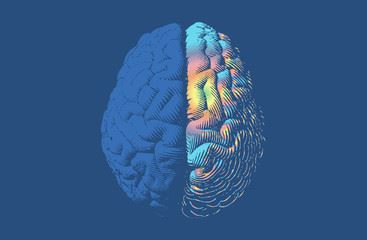
We often comfort those who are distraught by offering them the same advice we would offer ourselves were we in the same situation. Helping others to emotionally self-regulate can sometimes be stressful, however, especially when one’s efforts fail. Mindfulness-Based Stress Reduction (MBSR) can help people regulate their own stress but little is known about whether it can also reduce the stress of trying to help others.
Guendelman et al. [Neuroimgage] used a randomized controlled trial to test the effect of MBSR on participants’ use of acceptance, permission, and cognitive reappraisal strategies to regulate their own stress as well as the stress of another person and examined the brain regions associated with self- and other-regulation.
The researchers randomly assigned 68 German adults (average age = 38 years; 83% female) to either MBSR or a control condition. The MBSR program met in 8 standard weekly 2.5-hour group sessions with an all-day retreat and homework.
The control group met with the same frequency and read, listened to, shared, and discussed works of fiction, myth, and poetry in group and listened to audiobooks at home.
Participants were assessed at baseline and after intervention on a self-other emotional regulation task while undergoing brain functional magnetic resonance imaging (fMRI). The task required participants to alternately try to regulate their own emotions and the emotions of a confederate as they both viewed aversive and neutral photographs.
The photographs included the instructions “Gently accept!”, “Permit the reaction!”, or “This is just a photo!” which the participants alternately voiced to either themselves or the confederate. Participants were instructed as to what these acceptance, permission, and reappraisal strategies involved before beginning the task. These strategies were designed to reflect the strategies often presumed to underlie the effectiveness of MBSR.
Participants were also given false feedback on some trials that they had failed to successfully regulate their own or the confederate’s stress. Participants rated their stress after each photograph.
Study results showed the MBSR group showed significantly lower stress over time during self-regulation reappraisal trials while controls did not (η2p= .11). During self-regulation acceptance trials, the control group experienced increasing levels of stress, while the MBSR group did not (η2p= .09). No significant group x time interactions were found during the other-regulation trials or during any of the “permission” trials.
A complex pattern of significant brain region activation differences were found between the MBSR and control group during self-regulation acceptance, other-regulation reappraisal, and other-regulation acceptance trials.
The group of MBSR participants displayed greater brain activation in the parietal and insular cortices when regulating self-stress and in the precuneus and temporo-parietal junction when regulating other’s stress, especially while using the acceptance strategy. Brain region activation levels were not correlated with changes in self-reported stress.
The study shows MBSR can help participants self-regulate their own stress through both acceptance and cognitive reappraisal strategies but has no effect on the stress of attempting to regulate another person’s emotions.
Interpretation of the study is complicated by the fact that MBSR participants reported significantly greater stress during self-regulation reappraisal trials at baseline.
Reference:
Guendelman, S., Bayer, M., Prehn, K., & Dziobek, I. (2022). Towards a mechanistic understanding of mindfulness-based stress reduction (MBSR) using an RCT neuroimaging approach: Effects on regulating own stress in social and non-social situations. NeuroImage, 119059.
Link to study